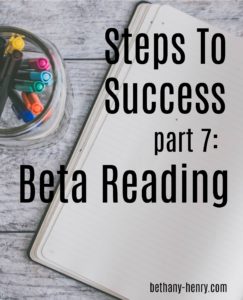Beta reading is the process of having other people look at our work and give critical feedback.
I know, I know. I hate asking for help too. And who likes receiving criticism?
Unfortunately, the solitary writer who classily churns out novel after novel on their vintage typewriter completely on their own isn’t a practical model to live by. Getting support and feedback from others is necessary for our writing to reach its full potential.
Today we’re looking at why beta reading is important and how to use it effectively.
This post is Part 7 of the Steps to Success series designed to walk us through the process of writing a novel from beginning to end. As always, personal preferences and experiences differ. This guide is based in part on my own experiences as well as from authors I have worked with and/or learned from along the way.
Find steps 1-6 here:
- Getting Started (where we look at our goals for writing and find our starting point)
- Developing Content (where we dig a bit deeper into what story we want to tell)
- Creating an Outline (where we brainstorm the basic structure of our story)
- The First Draft (where we get our writing plans in place and start our story)
- Rest (where we set our writing aside to breathe)
- Revising Our Writing (where we look at the revision process)
First of all, do we really need beta readers for our work?
It can be scary to let other people look at our writing. (What if they laugh at us??)
It can be a lot of work finding people who are willing and able to take the time and effort to give us feedback. Then we have to be patient and wait for the readers to give us their comments. And lastly, figuring out what to do with beta reader feedback can be confusing, require hard work, and be downright demoralizing.
However, there are several reasons why we need other people to look at our writing.
The main reason we need beta readers is because we simply can’t see our own work very clearly.
Essentially we’re far too close to the subject to see what works or doesn’t work in our story.
Taking a break and setting our story aside for a bit can give us some of this perspective. But having a few other people looking at our work can be incredibly valuable to get a fresh look and input into our work.
Beta readers can point out plot errors and missing pieces in our story that we won’t notice.
Beta readers can give good advice on how to strengthen our stories and our writing, potentially pointing us in directions we may not have thought of.
Beta readers are our first test readers: they can tell us if our story is enjoyable, which parts are funny, and which parts are boring.
Having beta readers and getting feedback will make our projects better and will make us better writers in the long run.

Getting Beta Feedback
So we’ve decided getting feedback is important, but how do we go about this?
Should we just send our chaotic and rambling first draft notes to everyone on our facebook friend list asking for comments? (Hint: Please don’t.)
Deciding when and how to ask for reviews of our writing is important to ensure the feedback we receive will be helpful.
Are We Ready For Feedback?
In order to make the best use of the people who are giving us their critiques on our work, it helps to have our writing at least somewhat put together.
Now don’t freak out. Our writing doesn’t need to be perfect. After all, the reason we’re getting feedback is because we know we need to improve our work.
However, if our project is filled with obvious mistakes, plot holes, head hopping, and typos, then our beta readers will end up spending all their time telling us about issues we could have fixed ourselves. The feedback doesn’t have a chance to be helpful because our writing wasn’t ready for it. This can be frustrating for everyone involved.
Instead, we should try to have our drafts in a place where we feel pretty good about them before giving them to our readers.
This way our readers can provide additional insights on our writing and not just end up telling us the 10 major issues that we already know about. Yes, this is more work for us in the short run since we need to look for and fix issues before giving it to our readers. But in the long run it will lead to the beta feedback being more effective and our writing being stronger.
What Kind Of Feedback Are We Looking For?
Some people like to receive early feedback to make sure their first thoughts and outlines are making sense.
Others like to hold off until their draft is as polished as they can possibly make it.
There isn’t a “right” way to go about this really. Like with everything, we all have different writing styles and things that work for us. Our personal writing styles and preferences will influence when we ask for feedback and what questions we ask our readers to consider.
It’s worth taking a minute to think about our own writing style and figure out when getting some feedback would be the most beneficial.
If we want our beta readers to give us major plot help then having them look at an early version of our story makes sense. However, if we wait until our story is more developed and polished, then our readers can potentially provide more detailed comments about character development, themes, or subplots that could be improved. Either (or both!) can be helpful.
So to review, before we ask for feedback we want to:
- Fix any issues that we already know about
- Have an idea of what type of feedback we’re looking for
This will help us to be prepared to use our beta feedback effectively.

How To Ask For Feedback
A first step to asking for feedback is to identify who may be available, qualified, and willing to read our work.
A good beta reader will be willing to read our work, provide helpful comments, and to return it in a timely manner.
It can be helpful to have multiple people giving us feedback since they can offer us different perspectives. I usually try to have between 3-6 readers of my drafts. This gives me enough feedback to be helpful but not so much that it is overwhelming. It also gives me a bit of leeway if one of my readers gets busy or can’t follow through with giving me feedback for some reason.
So where do we find these readers?
Friends and family members
This is often the easiest way to go about recruiting some beta readers.
Pro: Friends and family are often happy to help and support us.
Con: Since friends and family love us and want to support us, they may have a hard time giving criticism on our work. It’s nice to hear our work is perfect but we should take this feedback with a grain of salt.
Co-workers, acquaintances, friends of friends
Especially if they are interested in reading or writing themselves, even distant acquaintances, co-workers, or friends of friends may be happy to look at our work for us.
Pro: These individuals may be more willing to give honest/critical feedback and they may be able to offer a different perspective than someone in our close circles. If our beta readers have writing experience themselves they may also be more observant regarding story issues to fix.
Con: If these are people we don’t know well it may take more work to identify and approach those who may be willing to help.
Writing groups and forums
Whether in person or online, writing groups are a great place to find other writers who are willing to provide beta feedback.
Pro: Other writers can often provide detailed and helpful feedback on our work.
Con: When meeting and sharing information with new people, especially online, it is important to be cautious and aware of safety/privacy concerns.
Asking For Feedback
Once we’ve identified a few beta readers to give our work to, it’s finally time to ask for feedback. To do this we want to do a few things:
-
Ask our perspective readers if they’re willing to give feedback.
It’s scary to actually put ourselves out there and start this conversation sometimes but people are usually honored to be asked even if they aren’t able to help.
-
Give them a copy of our writing.
Whether it’s a hard copy or a shared file, we should find what’s best for our readers and get them a copy of our work.
-
Tell them what kind of feedback we want.
Do we want our readers’ overall impressions or do we have specific questions or areas we know we need advice with? Good areas to focus on are plot, character, setting, and theme.
-
Encourage our readers to be honest.
Honest feedback is what is most helpful so we need to ask our readers to be candid with their comments and assure them that we are able to handle criticism. (And then we need to follow through with that promise and accept it graciously.)
-
Agree on a deadline.
Even if we don’t have a publishing contract or firm deadline for our project, setting some sort of a deadline for feedback can help keep the project moving in a timely manner and it can help prevent miscommunications with our readers.
-
Thank them in advance!
Good beta readers are pure gold so we want to make sure to be properly appreciative!
Let It Go
Once we’ve handed off our work to our readers it’s time to take a deep breath and give ourselves a pat on the back. We’ve done good work! This is a great time to pause and rest.

Receiving Beta Feedback
Once we start to receive comments back from our readers we want to keep 3 things in mind:
-
The most important thing is to not take comments personally.
This can’t be emphasized enough. We asked for honest feedback and that’s hopefully what we’ve received. While it can be hard to see a list of things people didn’t like or understand about our project, this feedback is to make our story stronger.
It’s about our story, not about us.
If we’re feeling discouraged after receiving feedback it can be good to remember that people are giving us feedback because they believe in us and that we can make our story stronger.
In order to make good use of the feedback from our readers we need to be able to take a step back from our writing and evaluate it as objectively as possible.
So hang in there! I still think you’re awesome. 😉 -
We need to make some sort of a plan.
A little bit of organization when looking at feedback can go a long way to keep us from feeling overwhelmed by comments and the potential work to be done next.
This could look similar to our revision process after the first draft. With feedback we’ll need to evaluate the issues raised, decide whether we agree with our readers, and then brainstorm solutions.
Some comments received will be typos and small issues that are easy to fix. These can be handled in a straightforward manner. Bigger issues or changes we may not understand will take some more time and attention.
Basically it’s important to have some method to going through the feedback we’ve received so that it doesn’t bog us down. -
Remember that we’re the author.
Sometimes there’s conflicting comments from readers or opinions that just don’t like up with the way we want to tell the story. After receiving feedback we’ll need to make decisions on how best to tell our story.
Feedback is great and we want to use it to strengthen our writing, yet everyone has different opinions and styles.
The decisions on what to change, keep, or improve in our story may be hard but we can make them. We are the only one who can make them because at the end of the day, these are our stories. Go us!
Working with beta readers can be exhausting and stressful. Essentially we’re asking people to critique us in order to make more work for ourselves, which sounds a bit crazy. Yet all the work is worth it! Working with beta readers will make our writing better and that’s what we’re here for.
So let’s not be afraid to put ourselves out there! The more we practice getting and utilizing feedback the better we’ll get. And our writing will flourish as a result.
What makes having beta readers hard for you? What is your favorite question to ask readers about your work?




